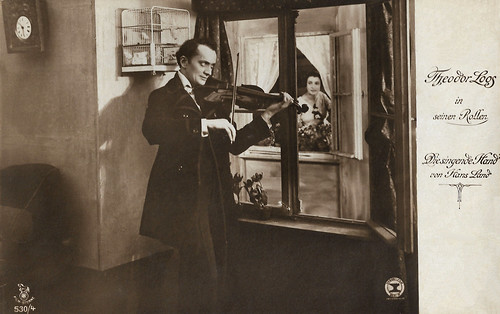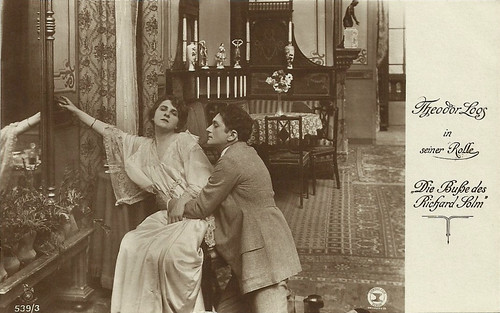Die singende Hand (1918)

German postcard in the Film-Sterne series by Rotophot, no. 530/1. Photo: Amboß-Film Dworsky & Co., Berlin. Theodor Loos as the violin player Leonid Heller in Die singende Hand/The Singing Hand (Arthur Wellin, 1918). The woman is Eva Speyer.

German postcard in the Film-Sterne series by Rotophot, no. 530/2. Photo: Amboß-Film Dworsky & Co., Berlin. Theodor Loos in Die singende Hand/The Singing Hand (Arthur Wellin, 1918).

German postcard in the Film-Sterne series by Rotophot, no. 530/3. Photo: Amboß-Film Dworsky & Co., Berlin. Theodor Loos in Die singende Hand/The Singing Hand (Arthur Wellin, 1918). The woman on the ground is Eva Speyer as Esther. The man left of Loos is Otto Gebühr, playing the Duke of Gralby.

German postcard in the Film-Sterne series by Rotophot, no. 530/4. Photo: Amboß-Film Dworsky & Co., Berlin. Theodor Loos in Die singende Hand/The Singing Hand (Arthur Wellin, 1918). The woman is Eva Speyer.
Who were Hugo Landsberger and Arthur Wellin?
Die Singende Hand/The Singing Hand (Arthur Wellin, 1918) was scripted by Hans Land, the pseudonym of Hugo Landsberger. Some sources erroneously mention the film was based on a novel by Hans Lau, but it was Landsberger who in hindsight in 1926 published his script as a novel, edited by Oestergaard. The producer, Rudolf Dworsky, was also responsible for the set design.
Hugo Landsberger (1861-reported missing 1938) was a Jewish writer, who produced several socially engaged short stories, books, and plays under the pseudonym of Hans Land, while he also produced popular entertainment works such as 'Stürme' (1909) and 'Staatsanwalt Jordan' (1915). From 1913 he also wrote various film scripts. Land also acted occasionally and directed the film Stürme (1913), based on his own work.
Arthur Wellin (1880-prob. 1941) was a Jewish film director, originally Arthur Lewin. He had been a prolific stage director before shifting to film, the reason for Austrian actor Alexander Moissi to engage him as a film director for 5 films between 1918 and 1920.
Wellin was also co-owner of Ambross-Film, with Dworsky. All in all, he directed some 27 silent films, and at times also acted. In 1933 he was expelled from acting when Hitler took over in Germany. In 1941 he was deported from Prague to the Lodz ghetto in Poland, and from there probably sent to one of the extermination camps.
The film Die Singende Hand/The Singing Hand (Arthur Wellin, 1918) premiered in Berlin in May 1918.
Die Buße des Richard Solm (1918)

German postcard in the Film-Sterne series by Rotophot, no. 539/2. Photo: Amboß-Film Dworsky & Co., Berlin. Theodor Loos in Die Buße des Richard Solm/The Penance of Richard Solm (Arthur Wellin, 1918).

German postcard in the Film-Sterne series by Rotophot, no. 539/3. Photo: Amboß-Film Dworsky & Co., Berlin. Lia Borré and Theodor Loos in Die Buße des Richard Solm/The Penance of Richard Solm (Arthur Wellin, 1918).

German postcard in the Film-Sterne series by Rotophot, no. 539/4. Photo: Amboß-Film Dworsky & Co., Berlin. Theodor Loos in Die Buße des Richard Solm/The Penance of Richard Solm (Arthur Wellin, 1918). The woman on the left is Lia Borré, the one on the right is Else Kühne.
Getrennte Welten (1918)

German postcard in the Film-Sterne series by Rotophot, no. 540/1. Photo: Amboß-Film - Dworsky Co. Theodor Loos and an unknown woman in Getrennte Welten/Separated Worlds (Arthur Wellin, 1918). It was Amboss's seventh film.

German postcard in the Film-Sterne series by Rotophot, no. 540/2. Photo: Amboß-Film - Dworsky Co. Theodor Loos and Gertrud Beitz in Getrennte Welten/Separated Worlds (Arthur Wellin, 1918).

German postcard in the Film-Sterne series by Rotophot, no. 540/3. Photo: Amboß-Film - Dworsky Co. Theodor Loos and Gertrud Beitz in Getrennte Welten/Separated Worlds (Arthur Wellin, 1918).

German postcard in the Film-Sterne series by Rotophot, no. 540/4. Photo: Amboß-Film - Dworsky Co. Theodor Loos and Gertrud Beitz in Getrennte Welten/Separated Worlds (Arthur Wellin, 1918).
Sources: Wikipedia and IMDb.
No comments:
Post a Comment